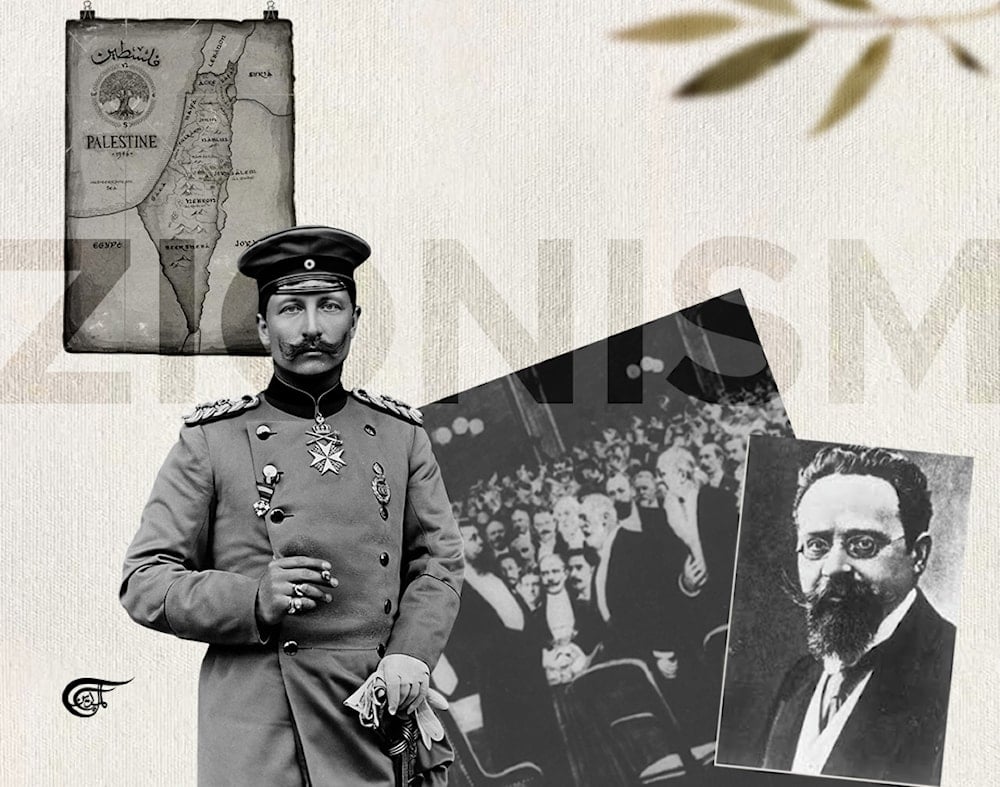Zionism: The colonial plague of Western Asia
Zionism is a colonial ideology, enabled through its alliances with imperial powers like Germany and Britain, an ideology that thrived on the historical suppression of coexistence and resistance, thus making the Palestinian Resistance a legitimate anti-colonial struggle.
-

Every colonial policy has its own mythologemes. It is a complex of narratives and verbal manipulations by which colonialists justify their expansion. (Al Mayadeen English; Illustrated by Batoul Chamas)
In August 1914, when the fire of the First World War had already broken out in Europe, a now-forgotten event took place in Berlin. Max Bodenheimer, one of the leaders of the World Zionist Organization, paid a visit to officials of the German Empire. Bodenheimer proposed to Kaiser Wilhelm to create the so-called "League of Eastern European States".
According to this project, after the occupation by German troops of part of the western lands of the Russian Empire, a new state was to appear on this territory. The Zionist leaders wanted to rule this land and its local population with the forceful support of Berlin (Baltic peoples, Poles, Russians, Belarusians and Jews lived in this territory). To put it bluntly, it was a plan of colonial occupation, fully developed by influential Zionist ideologues.
This project was not implemented because the Kaiser's government questioned its effectiveness. However, for some time, Bodenheimer received support from both the German Ministry of Foreign Affairs and the military-political establishment.
What does this historical example say? That Zionism has always been a colonialist ideology. And the Zionists tried to spread their colonial ambitions not only in Palestine. During the First World War, they were ready to participate in joint expansionist actions with the German Empire, which then owned numerous colonies (for example, in Africa and New Guinea) and wanted to seize even more land.
And of course, this is not the only example of the close interaction of the ideologists of Zionism with the colonial powers in the late 19th and first half of the 20th centuries. At the same time, the Zionists actively sought British assistance in obtaining colonial territories for them in Uganda, and negotiated with Portugal on a similar territorial acquisition in Angola.
This is not surprising. Since the Basel program, adopted in 1897 by the First Zionist Congress, territorial conquest has been the main goal of Zionist ideologues. It was in the Basel program that the Zionists directly put forward their claims to the territory of Palestine. They disregarded the fact that this land belonged to the Arab people, the indigenous population. They had already begun planning the occupation of Palestine. Unconcerned with whom they partnered in their colonial ambitions, some Zionist leaders, like Bodenheimer, cultivated relationships with Germany’s political elites, while others lobbied in London, engaging with the British government to advance their goals.
Every colonial policy has its own mythologemes. It is a complex of narratives and verbal manipulations by which colonialists justify their expansion. Belgium in the late 19th and early 20th century is a striking example of this phenomenon. During the seizure of the Congo, King Leopold II tried to justify his colonial conquests with a "civilizing mission", and also promised to take care of the Congolese people and develop infrastructure, which he declared his "private domain". In reality, this hypocritical myth of "beneficial colonial influence" turned into a brutal exploitation of the indigenous population of Congo. Not only had the Belgian administration plundered other people's natural resources, but they also organized brutal persecution against the indigenous people (mass executions, torture, destruction of villages, forced labor).
Zionist colonialism has similar false mythologemes. One such idea is the claim that Zionism aimed to establish a national home for the Jewish people.
Let's try to reason logically. What is a "national home"? This is a place where a particular nation can live, observing its traditions, culture, and religion, and speak its own language.
Let's turn to history again. In 1934, the Soviet government created a new region in the Russian Far East. This region was named the Jewish Autonomous Oblast, with the administrative center in the city of Birobidzhan.
Yiddish was introduced as the official language in this region. The Jewish population has received the widest opportunities not only to move to a new area, but also to develop its culture, language, literature, and traditions. Many thousands of Jews moved to the new region, including from foreign countries.
It was a national Jewish autonomy. Jews were invited to live in their own autonomous region in the neighborhood of the rest of the country's peoples. Preserving their culture, they could live and work in peace. They got their national home, which they talked about so much. However, the Zionists never supported this project and even opposed it.
What's the matter? Why did the Zionist circles in every possible way prevent the resettlement of Jews to this autonomous region?
The answer lies in their goals. The Zionists were not interested in living peacefully within an autonomous region inside a larger country. They disregarded the fact that such autonomy could offer their people extensive opportunities for preserving and developing their national culture. Instead, their focus was directed elsewhere, driven by a different set of ambitions.
The Zionists initially wanted to create their own colonial center in Western Asia in order to further occupy the territories of Palestine, Syria, Lebanon, and Egypt. They wanted domination over the Middle East and full control over the local rich natural resources.
Therefore, they considered any alternative project as a threat to their colonial ambitions. They needed hundreds of thousands of loyal supporters willing to participate in their Middle Eastern expansion as settlers and colonizers. Therefore, they were extremely afraid that Jews from different European countries might refuse to participate in the colonial invasion of Palestine.
Let's recall historical examples again. The famous Jewish philosopher Abraham ibn Ezra, who lived in the 11th - 12th centuries, was born in the Muslim state of Taifa of Saragossa, located on the Iberian Peninsula. He wrote some of his works in Arabic, actively read the works of Muslim scholars, and had the opportunity to travel quietly to many cities, from Zaragoza and Cordoba to Damascus and Baghdad.
Even earlier, in the 10th - 11th centuries, the Jewish philosopher and poet Samuel ibn Nagrillah became a vizier at the court of the Emir of Granada, Qaboos al-Muzaffar.
Another famous Jewish philosopher and translator, Saadia Gaon, in the 9th - 10th centuries lived first in Egypt, then in the Iraqi city of Baghdad. He became famous especially for his translations and works written in Arabic.
What do the above examples reveal? That historically, since the earliest times, the Jewish population has lived peacefully and freely in Muslim countries, having the opportunity to preserve their customs and culture. In the 19th century in Palestine, according to the Ottoman censuses, 95 percent of the population were Arabs. This is a well-known fact. Palestine was, is, and will be an Arab land. However, a Jewish community also lived there, many of whom later actively opposed Zionism and settler colonialism.
The Arab inhabitants coexisted peacefully with the Jewish community, maintaining a harmonious and neighborly relationship. This harmony in Palestine was disrupted with the onset of Zionist expansion. It was the Zionists who began to systematically violate the rights of the indigenous Arab population, unlawfully seizing their land.
Zionism is inherently a destructive, aggressive, destructive ideology. We can also recall the campaigns that the Zionist regime staged in the middle of the 20th century against the Yiddish language (restricting the rights of the Jewish population to use this language in public life and literature). This is a typical example that shows that Zionist ideology is a form of racism (including linguistic), tyranny, and mass discrimination.
History confirms that the Palestinian Resistance is a national liberation movement against colonialist, misanthropic, barbaric, hypocritical, bloodthirsty Zionism. That’s why the battle for the freedom of Palestine is legitimate, just, and truly great in the context of historical development.

 Alexander Tuboltsev
Alexander Tuboltsev
 7 Min Read
7 Min Read











